Sepsis negligence claims seek compensation for the damage done by the misdiagnosis of sepsis.
Sepsis will damage your organs, limbs, cause long-term health issues and death, but early diagnosis and intervention can save many patients.
44,000 people die in the UK each year as a result of sepsis.
Medical negligence by missing the signs of sepsis lies behind some of these deaths.
Each hospital will have a sepsis pathway or protocol to quickly aggressively deal with sepsis. GPs are also well trained to note the signs of sepsis.
A busy doctor may miss your signs of sepsis, but that is not an excuse for sepsis negligence.
A fully-trained medical professional must always be aware of the symptoms of sepsis.

Table of content
What is sepsis?
Sepsis is your immune system’s life-threatening reaction to an existing infection. If left untreated, sepsis will do irreparable damage to your body, causing multi-organ failure and death.
An infection can start anywhere, and when you develop sepsis, your immune system goes into overload, causing shock throughout the body.
Sepsis is such a fast-acting and dangerous condition that an examining doctor should never miss it.
Sepsis spreads so quickly that it is sometimes only diagnosed when it is too late, when the damage is done.
It is vital that a doctor diagnoses sepsis as soon as possible to avoid life-long damage to the organs and possible death.
When the doctor misses the signs of sepsis, it is medical negligence. They are working at levels below acceptable standards, and in a way no other doctor working professionally would carry out their duty.
A sepsis negligence claim will seek the compensation due to you for the damage done by the effects of sepsis.
Signs of sepsis
The effects of sepsis are damage to the organs of your body, a rapid deterioration in your health, and, if left untreated, death.
Doctors know the shocking effects of sepsis. They should be fully trained to spot the signs and take action to prevent sepsis.
Sepsis starts as an infection in the body that goes untreated. It quickly spreads, and the effects of sepsis are:
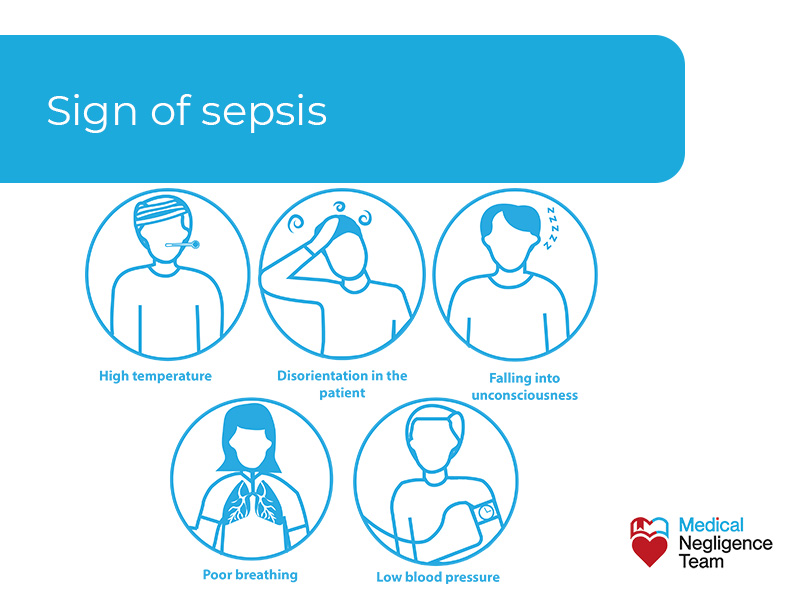
To continue to ignore or misdiagnose sepsis costs time and leads to further damage to your body.
Medical guidelines state that once the effects of sepsis develop the medical team should act quickly and decisively by following the Sepsis Six protocol.
What is the Sepsis Six protocol?
The Sepsis Six protocol is the international standard for dealing with sepsis once a diagnosis has been made.
Following a sepsis diagnosis, the medical team should immediately begin treating the patient with the six steps.
The Sepsis Six protocol for dealing with diagnosed sepsis are:
- Giving the patient high-flow oxygen
- Taking blood cultures from the patient
- Administering strong IV antibiotics
- Giving fluids through an intravenous drip
- Monitoring urine output
- Checking serial lactates
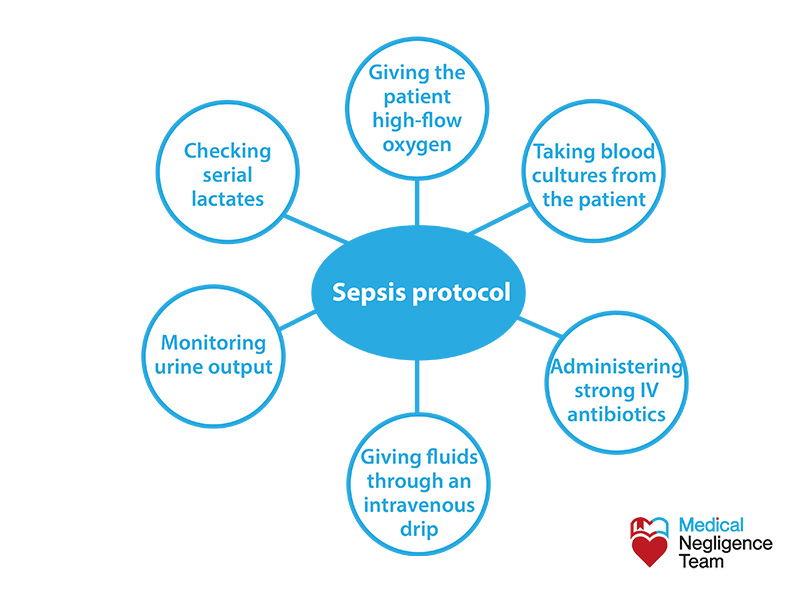
All six steps of the Sepsis Six protocol should be carried out in the first hour.
Missing the signs of sepsis and failing to treat can lead to life threatening situations.
Not following the Sepsis Six protocol is medical negligence, and any form of medical negligence leading to sepsis will give you a sepsis negligence compensation claim.
How can medical negligence lead to sepsis?
Medical negligence can lead to sepsis by ignoring the signs of infection.
Sepsis starts with the immune system overreacting to an infection in the body. Anything can happen to the body when the immune system goes haywire due to sepsis.
The medical negligence in missing the early signs of infection leading to sepsis causes the body to begin to shut down. If left untreated, sepsis will cause organ failure and death.
Medical negligence can lead to sepsis by:
Sepsis can spread quickly if not diagnosed at an early stage, and the medical negligence will lead to sepsis doing untold damage to the body.
Missing the signs of infection
Missing the signs of infection should never happen when the doctor is doing their job correctly. Running a routine of basic tests such as bloods, temperature, and skin checks should spot the signs of infection.
An infection in the lungs, liver or kidneys can quickly develop into sepsis and cause organ failure and the other outcomes of untreated sepsis.
It is medical negligence when a doctor misses signs of infection, and you can claim medical negligence compensation.
Not treating an infection correctly
Not treating an infection correctly is when a doctor diagnoses an infection but does not prescribe the correct treatment.
It could be that the doctor does not prescribe a strong enough antibiotic or does not recommend intravenous infusion. The doctor should prescribe paracetamol to control temperature and maybe intensive care admission for very ill patients.
When a doctor does not treat an infection correctly, sepsis is often the next step.
Not accounting for MRSA or other outbreaks in the hospital
Not accounting for MRSA or other outbreaks in the hospital when diagnosing your condition is serious medical negligence.
Difficult to treat hospital-based infections such as MRSA prey on sick patients and those undergoing and recovering from surgery. For a doctor to not take this into account when you show signs of infection is very poor medical treatment.
Medical negligence causes the infection to spread, and sepsis may be the next step in your illness.
Not giving antibiotics after surgery or childbirth
Not giving antibiotics after surgery or childbirth is a serious breach of standard medical treatment. Your body is very vulnerable to infection at these times, and even basic antibiotics can prevent infection.
Sepsis starts from an untreated infection, and infection often gets into the body during surgery. The doctor or surgeon should prescribe antibiotics after every type of surgery and after the birth of a child, and to not do so is medical negligence.
If the doctor does prescribe antibiotics, but they are not given by nursing staff, it is medical negligence too.
Not treating infected skin tissue complications
Not diagnosing the initial signs of sepsis, such as high temperature and clammy skin, can only make sepsis inevitable.
The medical negligence of a trained doctor not spotting the initial signs of sepsis can cause irreparable damage to your body.
The out-of-control sepsis will spread quickly and, left untreated, can lead to death. You or your loved ones can claim medical negligence compensation for the effects of not diagnosing the initial signs of sepsis.
Medical negligence when poorly treating infections in the body leads to sepsis. Sepsis is a life-threatening condition; you will have a medical negligence compensation claim when it is not diagnosed.
A sepsis negligence claim for compensation will take what happened and get you the money you deserve for the suffering caused by the missed diagnosis of sepsis.
Not diagnosing the initial signs of sepsis
Not treating infected skin tissue complications with antibiotics will lead to sepsis developing from the wound. Dead or dying skin quickly becomes infected by bacteria, and around an open wound or sore, it will transfer seamlessly to the body.
Sepsis results from untreated infections getting into the organs and the bloodstream. By not removing infected, dead skin and treating the wound, the doctor opens the body to infection.
When they double down on medical negligence by not prescribing antibiotics, sepsis will quickly take over your body.
Who is at fault for sepsis negligence?
A doctor is at fault for sepsis negligence. They are trained professionals responsible for diagnosing and treating any infection in your body.
When they miss the signs of infection and sepsis occurs, it is sepsis negligence, and you will have a medical negligence claim for compensation.
Sepsis negligence is when a doctor misses the signs of sepsis developing in your body. Any doctor behaving professionally will know the protocol for diagnosing and treating sepsis.
Sepsis negligence will lead to damage to your organs and long-term health. You will have a sepsis negligence claim for compensation when it happens to you, and a No Win No Fee solicitor will handle your case.
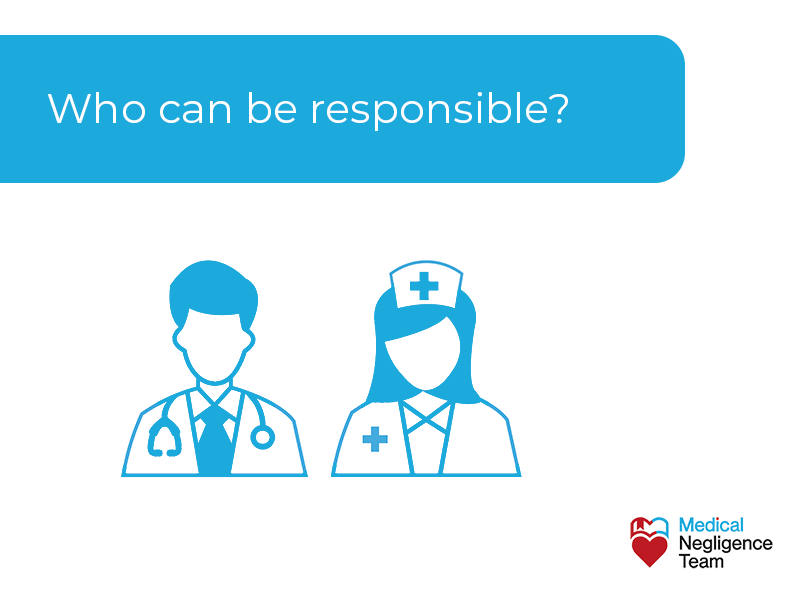
How much can I claim in compensation for sepsis negligence?
You can claim compensation for sepsis negligence amounts from the £10,000s to more than £1 million. The amount awarded in each sepsis negligence case differs, and only a consultation with an experienced medical negligence solicitor will give you an accurate estimate.
Claims in compensation for sepsis negligence can award:
Your No Win No Fee medical negligence solicitor will guide you through a sepsis negligence claim.
How do I make a sepsis negligence claim?
You make a sepsis negligence claim by contacting a No Win No Fee medical negligence solicitor.
They will explain the process of making a sepsis negligence claim and how you can sue for two types of compensation damages: General damages and Special damages.
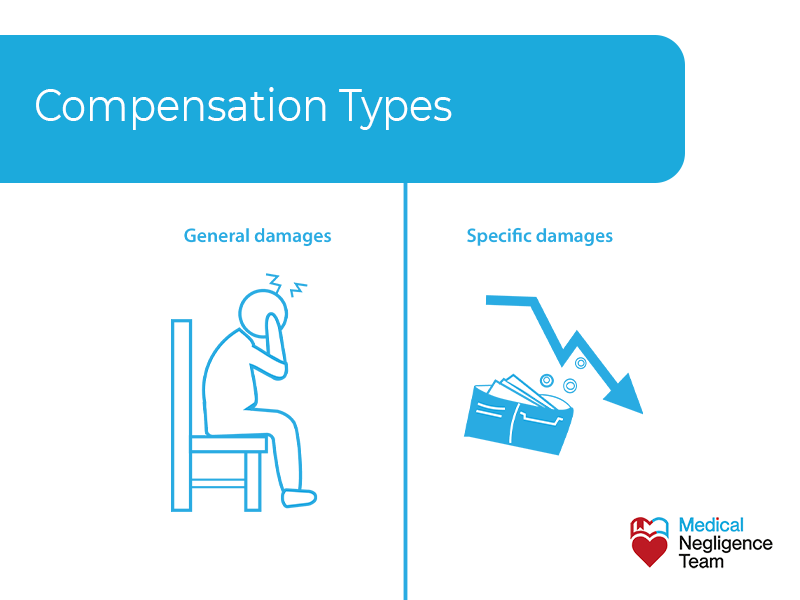
General damages
General damages are when you sue for the pain, suffering and the loss of amenity, PSLA, you have experienced due to sepsis negligence.
Special damages
Special damages include loss of earnings, future care costs, and out-of-pocket expenses.
Be sure to keep payslips, receipts and proof of any losses experienced as a result of the sepsis negligence.
You deserve compensation to cover all losses, including loss of life, medical costs and any long-term care needs. When you or a loved one suffers from the effects of sepsis negligence, you make a sepsis negligence claim for compensation.
Your No Win No Fee solicitor will guide you through the steps in making a sepsis negligence claim.
The steps involved when making a sepsis negligence claim
The steps involved when making a sepsis negligence claim are a part of any successful medical negligence case. When you follow them correctly and get all the facts and figures together, your medical negligence solicitor will do the rest.
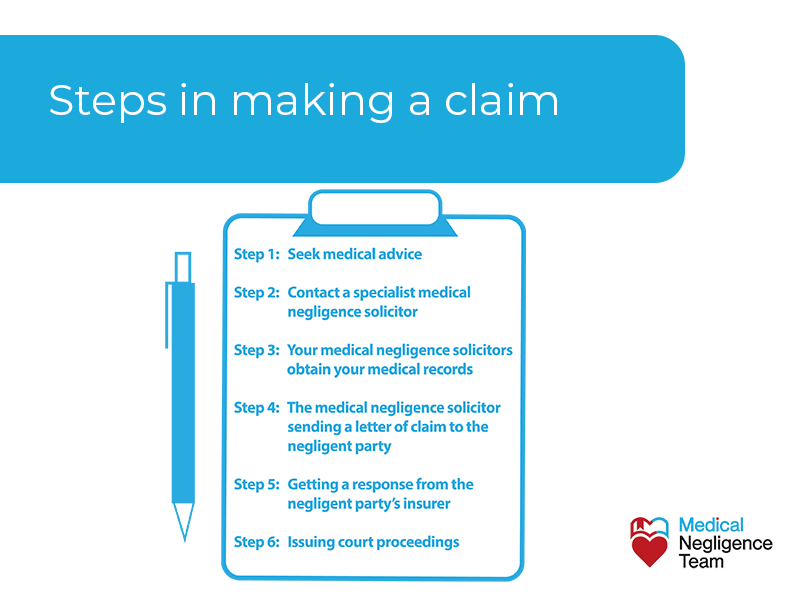
Step 1: Seek medical advice
Seek medical advice on the injuries you or your loved one have suffered or are suffering with immediately you realise the sepsis negligence.
Step 2: Contact a specialist medical negligence solicitor
Contact a specialist medical negligence solicitor who operates on a No Win No Fee basis and tell them what went wrong. The right solicitor will look at your case, see where the problem lies, and advise if you suffered sepsis negligence.
The Medical Negligence Team also has a 100% Compensation Guarantee scheme, where you get all the money awarded in a negligence claim.
You or your loved one suffered the sepsis negligence, and you should get all the money due for the suffering.
Step 3: Your medical negligence solicitor obtains your medical records
Your medical negligence solicitor obtains your medical records with your permission. By reading your records, they will confirm if they think you have a valid sepsis negligence case.
The medical negligence team will know from reading your medical records if the case will result in sepsis negligence compensation being paid.
Step 4: The medical negligence solicitor sending a letter of claim to the negligent party
The medical negligence solicitor sending a letter of claim to the negligent party is the next step. The letter will ask them to admit sepsis negligence in what is known as ‘sending a letter of claim.’
When the negligent party receives the letter of claim, it has up to four months to provide a written response.
Step 5: Getting a response from the negligent party’s insurer
Getting a response from the negligent party’s insurer will move your compensation claim closer to a conclusion.
The insurer will either admit the negligence or say they intend to defend the case. Deciding to defend the case is known as ‘deny liability’ in legal terms.
If they admit liability, your sepsis negligence claim can be valued.
The two parties will meet to decide on your sepsis negligence compensation payment.
Your solicitor will negotiate with the negligent party and use their experience to get the compensation you deserve.
Step 6: Issuing court proceedings
Issuing court proceedings is the next step if they deny liability in your sepsis negligence case. Going to court happens, too, when they are not prepared to pay a fair amount for the injuries you have suffered.
Your medical negligence solicitor issues the court proceedings.
Remember that less than 1% of negligence cases go to trial.
Our Process
Our team members have a higher career win rate with a 75% success rate on NHS letters of claim, compared to an industry average of 54.5%.
Enquiry
The first step is to get in touch and tell us what went wrong. It’s free and easy. Call our 24-hour helpline: 0800 246 1122 or request a callback here.
Medical Evaluation
Once you have spoken with our team we’ll let you know how we can help. Typically the next step is to obtain your medical records for us to review.
Legal Letter
Once all your medical records have been received they will be reviewed by a medically & legally qualified member of our team. If there is evidence of medical negligence we will send a letter of claim to the negligent party outlining your medical negligence claim.
Using a No Win No Fee solicitor
Using a No Win No Fee solicitor is the only way to a successful sepsis negligence claim. Your No Win No Fee medical negligence solicitor will not charge you for a claim you do not win.
If any solicitor starts talking of a ‘win fee’ or a ‘success fee,’ you should walk away. The negligent party insurers should pay all your legal fees and you should get 100% compensation.
The medical negligence solicitor should also operate a 100% Compensation Guarantee scheme. When you win the case, all the money awarded should go to you, not the solicitor.
You or your loved one suffered sepsis negligence, and you deserve the compensation to get your life back to normal.
How long do I have to make a claim for sepsis negligence?
You have three years to make a claim for sepsis negligence. All medical negligence claims are subject to limitation periods.
For example, in England and Wales, medical negligence claims must generally be brought, court proceedings issued within three years of the injury, or three years of knowledge of the facts giving rise to the claim.
If someone has passed away, the three years would start from the date of death if the limitation period has not already expired at the date of death.
Children not under a disability typically have until they reach 21 to start a sepsis negligence claim or court proceedings.
Persons under a disability, who lack capacity, are not subject to any limitation period.
Contact The Medical Negligence Team
Contact the Medical Negligence Team today to discuss your sepsis negligence claim for compensation. We have both the legal and medical experts to guide you along the steps to a successful sepsis negligence claim for compensation.
At the Medical Negligence Team, we fight every compensation claim on a No Win No Fee basis. You will not be out of pocket for an unsuccessful claim.
We have a very high success rate and a reputation for a speedy and successful resolution to all medical negligence cases.
Our 100% Compensation Guarantee puts all the money you win into your pocket. You or your loved one suffered sepsis negligence, and you deserve every penny of the compensation.
Contact us at the Medical Negligence Team for all your medical negligence needs.


